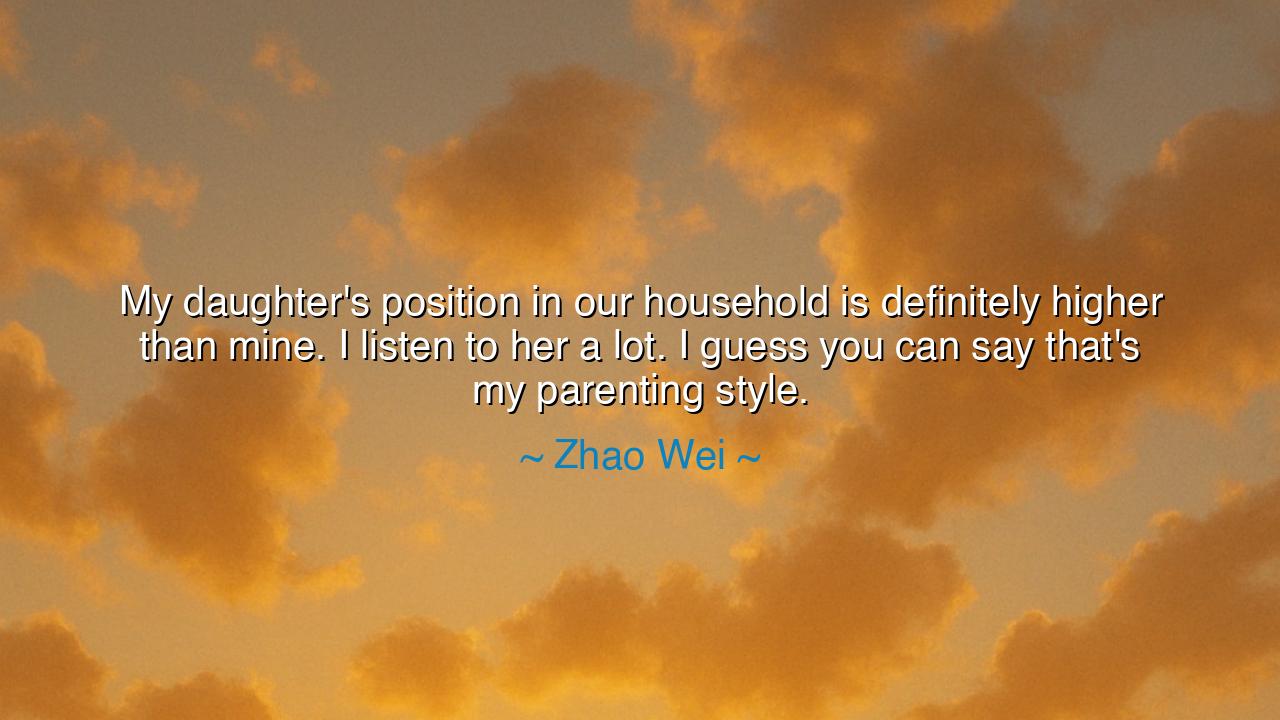
My daughter's position in our household is definitely higher
My daughter's position in our household is definitely higher than mine. I listen to her a lot. I guess you can say that's my parenting style.






Hearken, O seekers of wisdom, to the tender words of Zhao Wei, who declares with humility that her daughter’s position in their household is higher than her own. She reveals a style of parenting that honors the voice of the child, listening intently, allowing the young one’s thoughts and feelings to shape the rhythm of the home. In these words lies a truth as profound as it is gentle: the guardian who listens, who lowers their own voice to hear the voice of the child, does not lose authority, but gains trust, respect, and enduring connection.
The origin of this insight rests in the timeless principle of reciprocity between parent and child. Across the ages, philosophers and sages have taught that the parent is not merely a ruler, but a guide, a mentor, and at times a student. Confucius himself, though often associated with order and hierarchy, recognized the importance of listening, respect, and empathy in the harmony of relationships. Zhao Wei’s confession resonates with this tradition, for she elevates the child’s voice, demonstrating that in listening lies the deepest form of authority: the authority of love.
Consider the life of Marcus Aurelius, the Roman emperor and Stoic philosopher, who, in his Meditations, often reflected on the lessons he learned from those around him—including his children. Though he wielded power over an empire, he admitted that humility and openness to learning were the foundation of wisdom. Zhao Wei’s words mirror this same spirit: by listening to her daughter, she accepts that wisdom flows in both directions, from elder to child and from child to elder.
The emotional resonance of her words is powerful. In many households, the voices of children are overlooked, silenced beneath the weight of authority. Yet Zhao Wei confesses the opposite: her daughter’s voice is heard, respected, and cherished. In doing so, she reveals that authority rooted in humility and empathy creates stronger bonds than authority enforced by fear or rigidity. Her style of parenting is not weakness, but a profound strength, for it teaches her daughter that her thoughts matter, that she belongs, and that love is inseparable from respect.
In practical terms, Zhao Wei’s insight offers guidance for all who raise or guide children. To listen deeply is to acknowledge the individuality of the child, to understand their needs, fears, and aspirations. This does not mean abandoning boundaries or dissolving guidance, but weaving discipline with compassion, authority with humility. Historical and modern examples alike—from Montessori’s method of child-centered education to indigenous traditions of storytelling and dialogue—demonstrate that children flourish when their voices are valued.
Her words also carry a heroic dimension, for to lower oneself in humility before a child requires courage. Many fear that listening undermines authority, yet Zhao Wei shows that it strengthens trust. By placing her daughter “higher” within the household, she models not weakness but the greatness of servant-leadership, the kind of guidance that elevates others rather than suppresses them. In this, her household becomes not a battleground of wills, but a sanctuary of respect and mutual growth.
From this understanding arises a practical lesson: let all who are parents or guardians cultivate the art of listening. Do not dismiss the voices of the young, for in their simplicity lies truth, and in their innocence, wisdom. Let the child know that their voice matters, for this builds confidence, empathy, and trust. At the same time, guide with compassion, teaching them through example how to balance their own individuality with the needs of the whole household.
Thus, the teaching of Zhao Wei endures: true parenting is not domination, but dialogue, not silencing, but listening. Let all who undertake the sacred duty of raising children learn to lower their pride and open their hearts. For in honoring the voice of the child, the parent creates not only harmony within the home, but the conditions for the child to grow into a wise, confident, and compassionate adult, carrying forward the legacy of respect across generations.






AAdministratorAdministrator
Welcome, honored guests. Please leave a comment, we will respond soon